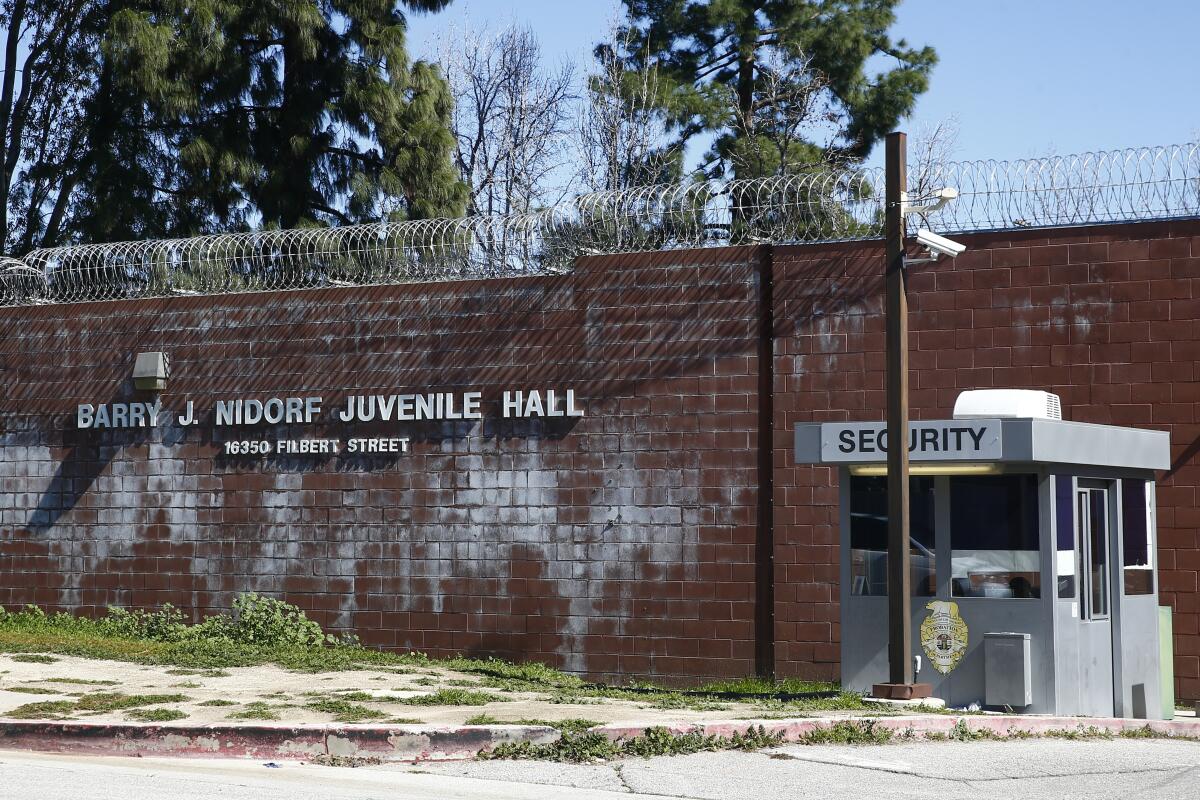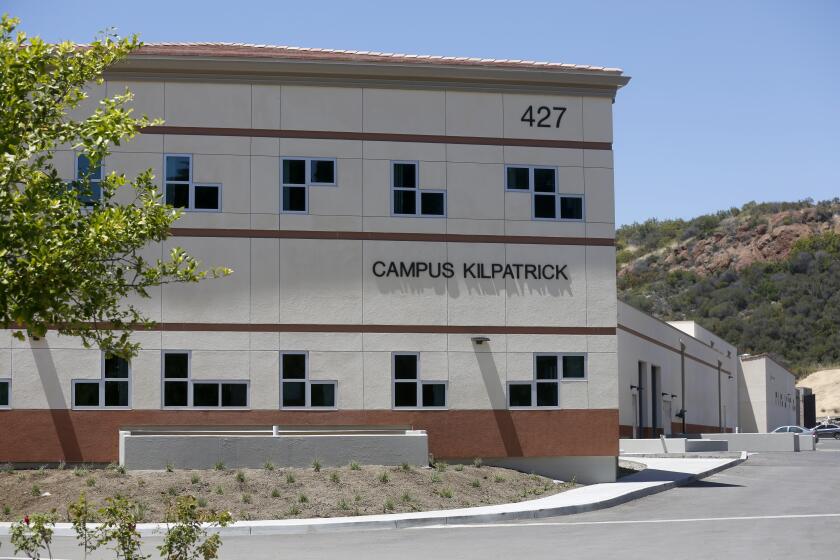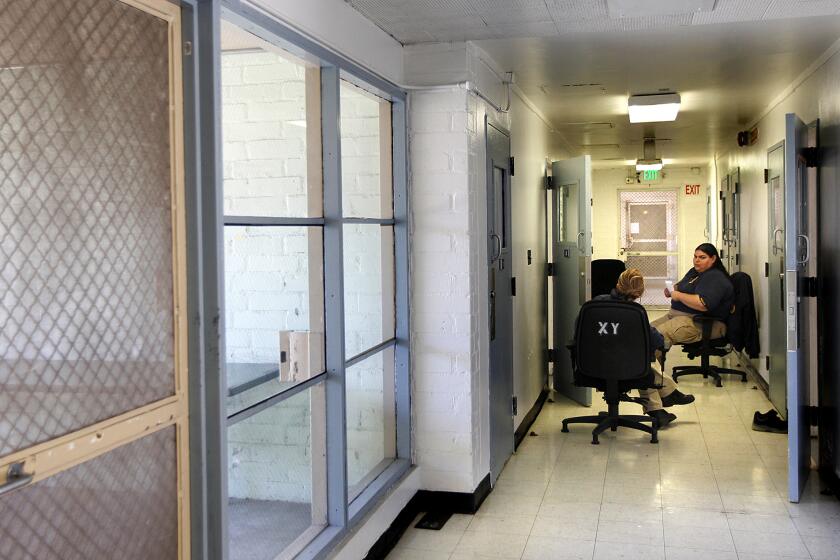Editorial: Probation worker no-shows are the last straw. Break up and remake L.A. County juvenile justice

At the end of last week there were three juveniles at Campus Kilpatrick, the $53-million state-of-the-art Los Angeles County probation camp in the Malibu hills, taking part in innovative rehabilitation programs.
At the same time 200 young people were housed about 40 miles away at Barry J. Nidorf Juvenile Hall in Sylmar with nothing to do but watch TV and play video games, under the supervision of a nervous and exhausted Los Angeles County Probation Department staff working mandatory overtime at the volatile facility because on any given day, half of their fellow employees don’t show up for work.
Among the youth at Nidorf are also highly motivated teenagers ready to participate in the programming, trauma care and education for which Campus Kilpatrick was built. Obviously, they should be transferred immediately to Kilpatrick to get their education on track without further delay, and probation staff should go with them. Unlike the two juvenile halls — Nidorf in Sylmar and Central Juvenile Hall near downtown, both of which are supposed to be short-term holding facilities — the camps can accommodate counseling, treatment, education and recreation.
Bureaucratic snafus, organizational culture and inconsistent leadership are undermining the visionary “L.A. Model” of juvenile rehabilitation.
But a coalition of probation employee unions is holding up the Kilpatrick transfers pending negotiations. And meanwhile, many officers assigned to the two juvenile halls just aren’t bothering to come in.
This isn’t a staff shortage issue. The population of California’s juvenile justice system has plunged over the last decade, in part because of a significant drop in youth crime and in part because the vast network of halls and camps was never the right solution for young people who are better handled with community-based supervision. Los Angeles County closed all but six of its 21 probation camps and one of its three juvenile halls as the population of locked-up youth was cut by three-quarters. But the probation staff dropped in size by only a quarter.
The current situation is so unbelievable, and so dangerous, that members of the Board of State and Community Corrections struggled at a series of recent public meetings to retain their composure.
“This is not normal,” an astonished Fresno County Chief Probation Officer Kirk Haynes said of the sickouts.
“In any other job you’d be fired,” film producer and youth advocate Scott Budnick said.
Palm Springs Police Chief Andrew Mills said they should find a different job “if they can’t do the one they are currently getting paid for.”
All 147 youths at Central Juvenile Hall were moved out over the weekend in a mass transfer that employees called disorganized and dangerous.
In L.A. County, though, none of this is particularly new. A decade ago, absenteeism got so bad sheriff’s deputies were sent to probation employees’ homes to get them to come to work. Today that job is handled, without much success, by an in-house return-to-work unit.
Other labor problems abound. Department employees have repeatedly been accused of abusing the young people they are supposed to help.
The Board of Supervisors is sitting on a study that found the “L.A. Model” of juvenile rehabilitation was never actually realized in part because the labor contract wouldn’t accommodate scheduling changes meant to consistently pair mentors with troubled teenagers. The unions wouldn’t budge from their odd work shifts that benefit the employees but not the youths.
Repeatedly over the last year, corrections board investigations found that probation workers faked written certification that they checked on juveniles in their rooms every 15 minutes, a basic safety mandate. Department supervisors faked certification that they reviewed video documentation of the checks.
Mills, the Palm Springs police chief, suggested at a recent corrections board meeting that the proper response to employee intransigence might be “Camden.” The New Jersey city dissolved and replaced its police department in 2013 to break a culture of corruption and union resistance to reform.
He might be onto something. The Probation Department has had on average one new leader every two years, each one coming in as the department’s hoped-for savior — and leaving defeated by a workforce that makes constructive change impossible and work life a living hell for those dedicated employees who do show up, wanting to help the youth in their charge.
Defunding police is not a new idea, and it is not a panacea. It’s also not crazy.
The unions are currently objecting to the county posting job openings for employees in the brand-new Department of Youth Development — jobs that probation workers say ought to belong to them.
But the Board of Supervisors created the new department largely because the existing one, or at least a significant segment of its workers, remains resistant to the board’s demands for accountability and reform.
Youth justice advocates in L.A. have borrowed the term “just transition” from the climate change movement. In the energy sector, just transition calls for retraining or compensating front-line workers whose jobs in the fossil fuel industry are phased out. The same principle that applies to coal miners should apply to juvenile probation.
But there can be no “just transition” if there is no transition. It has been three years since the Board of Supervisors voted to explore moving juvenile justice out of the Probation Department. Doing so will require changes to state law, further build-out of the Department of Youth Development and a just transition program. If the supervisors are serious about fixing the juvenile justice system, they will get on with these needed actions.
Meanwhile they should declare an impasse in labor negotiations to get juveniles and staff out of Nidorf and into Kilpatrick. There is no legitimate reason not to get that done by Labor Day.
Should the board also lift a hiring freeze to rush new probation officers (who might actually show up for work) to Nidorf? Some corrections board members say yes, in order to defuse the dangerous situation there.
Supervisors must put safety and security first. Still, they ought to be able to achieve those ends without enlarging a department they have correctly decided to shrink.
More to Read
A cure for the common opinion
Get thought-provoking perspectives with our weekly newsletter.
You may occasionally receive promotional content from the Los Angeles Times.













